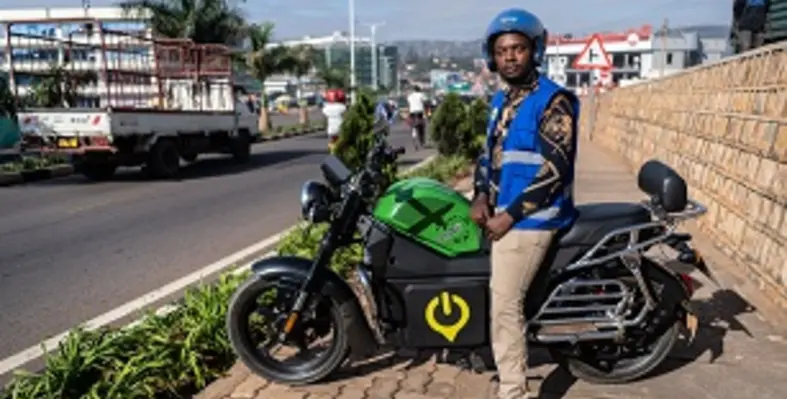Electric motorcycle, bike and scooter manufacturer, Spiro is making good progress on its vision of a world where everyone can access affordable and clean mobility solutions after unveiling plans to significantly expand its fleet in Togo and Benin
According to the company, this latest development (enabled by backing from Societe Generale and GuarantCo) has propelled its mission to tackle the climate emergency, enhance public health, and stimulate economic growth in Africa and builds on its established base within the two countries, as well as Rwanda and Uganda.
With the company moving from strength-to-strength and with clearly no plans of slowing down, African Review heard from Jules Samain, co-CEO of Spiro, to discover more about how the company has reached this firm position and what targets it has set for the future.
African Review (AR): What advantages do your electric bikes hold over more traditional alternatives?
Jules Samain (JS): Spiro's electric bikes are a game-changer in the transition towards cleaner mobility. Unlike traditional ICE bikes, they emit zero carbon emissions, contributing to cleaner air and aligning with global efforts to fight climate change. The health implications of this cannot be understated, especially in congested urban areas where pollution levels can be detrimental.
Additionally, electric bikes are more economical in the long run, with fewer moving parts requiring maintenance and no fuel costs. In our operations across several African countries, riders have experienced the immediate benefits of these advantages, saving on daily expenses and contributing to environmental sustainability.
AR: What coverage of ‘swapping stations’ do you have across the countries to enable customers to fulfil their daily needs?
JS: Spiro's innovative battery-swapping stations have been a key element of our success. One of the concerns people initially had when we first reached the market was ‘range anxiety’, but with over 355 strategically placed across cities and rural areas, this is not something people worry about any more.
These stations allow riders to replace depleted batteries with fully charged ones quickly. In countries like Uganda, where we are deploying 140,000 electric motorbikes, these stations are integral in ensuring continuous mobility. The advantages are manifold – they reduce downtime, enable extended driving range, and make the adoption of electric bikes as convenient as traditional bikes, if not more.
AR: What are some of the misconceptions around electric mobility in Africa that you encounter and how do you respond to these?
in Africa that you encounter and how do you respond to these?
JS: Misconceptions around electric mobility in Africa include perceived high upfront costs, limited power, and lack of infrastructure. Spiro tackles these by showcasing our motorbikes' robust performance, lower total cost of ownership, and comprehensive support system. We run special deals for Motorbike Taxis to make sure their transition to electric is an easy one.
In Benin, our partnership with reputable scrap dealers ensures that old bikes are removed from circulation and replaced with cleaner alternatives. By engaging directly with the communities we serve, we're able to break down these misconceptions and build trust in our products and vision.
AR: Why is electric mobility such a hot topic in many countries across Africa and how has this interest developed in recent years from your perspective?
JS: Electric mobility is gaining traction across Africa, driven by a collective desire for cleaner, sustainable solutions. Countries are waking up to the reality of pollution and the potential of renewable energy. We will soon launch in Kenya and the very forward-thinking Government has laid the groundwork for broad adoption.
Spiro is at the forefront of this change, providing real, tangible solutions. Looking forward, we envision deeper collaboration between governments, private sectors, and communities to fully realise the potential of electric mobility across the continent.
AR: How do the green-transportation challenges differ from Uganda, Rwanda, Benin and Togo?
JS: Green-transportation challenges vary greatly across these countries, reflecting unique regulatory landscapes, infrastructure readiness, and public perception. Spiro's approach is to customise solutions for each market. In Benin, for instance, we've worked with partners to ensure our riders get extra value, with services like insurance and mobile phone connection bundled into our deals, while in Uganda, we're scaling up with significant deployments.
National governments are instrumental in shaping policies and providing support. Their collaboration is vital in creating a favorable trading environment that allows us to effectively meet each country's specific needs.
AR: Why has Spiro adopted the ‘vocal for local’ concept and developing factories in the countries you serve?
JS: We are passionate about developing strategies to include employment opportunities for local people, both men and women, in all parts of our business. By developing factories and sourcing locally, we create jobs, foster technological expertise, and contribute to the local economy.
In countries like Togo, where we were honored by the presence of the Minister of Environment, Mr. Foli Bazi, during a recent scrapping event, our efforts are recognised at the highest levels. These investments not only bring economic growth but cultivate a sense of ownership and pride within the communities we serve.
AR: How are you hoping to develop your bikes in the future? Are there any technological aspects you are particularly pursuing or would like to ultimately incorporate and what would impact would that have? 
JS: Spiro's vision for the future includes technological enhancements to further improve efficiency, user experience, and integration with existing transportation systems. Innovations in battery technology, digital interfaces, and connectivity will make our bikes more appealing and functional, opening up new opportunities for integration with public transportation and broadening our reach across different segments of the population.
AR: Having secured the funding from Societe Generale and GuarantCo, what is the next target for Spiro?
JS: The recent funding is more than a financial boost; it's a validation of Spiro's vision and strategy. These funds will specifically be targeted at growth in our existing markets in Benin and Togo. But we are actively using this momentum to solidify our presence in our developing markets like Rwanda and Uganda, where our deployment of 140,000 electric motorbikes is a testimony to our scaling capability.
Our next target includes expansion into other promising East African markets such as Kenya, where our solutions can make a significant impact. We are excited to continue our journey towards cleaner and more sustainable mobility across the continent, working hand-in-hand with local communities and governments.












